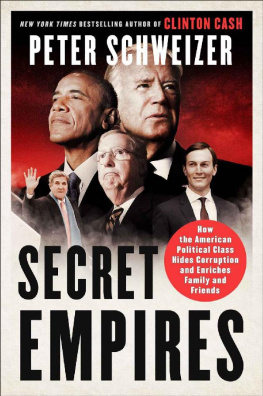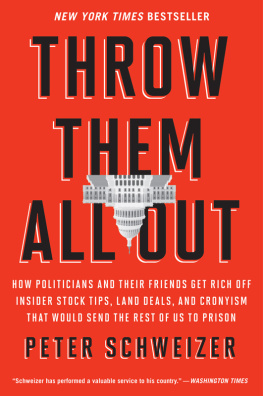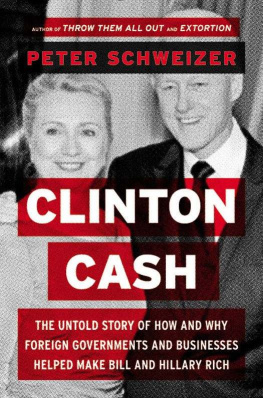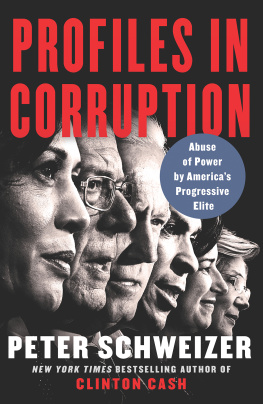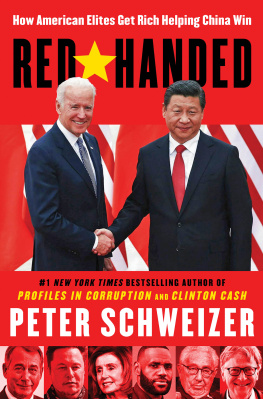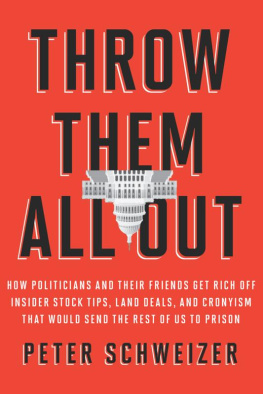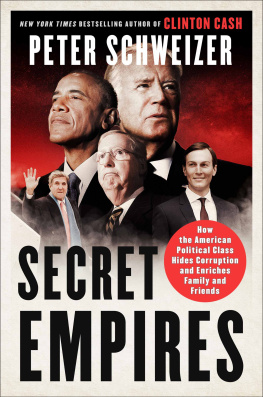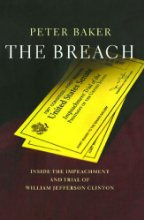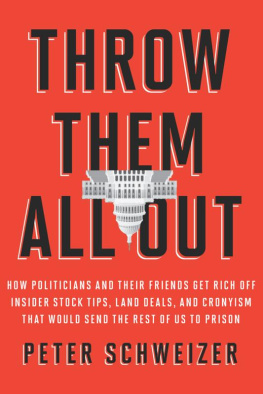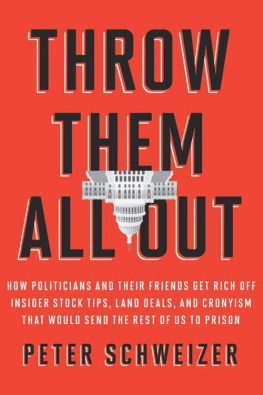For
Jack & Hannah
Contents
Public office is a privilege, not a right, and people who accept the privilege of holding office in the Government must of necessity accept that their entire conduct should be open to inspection by the people they are serving.
HARRY TRUMAN
- A new corruption that is extremely difficult to detect is taking over our political system.
- It is most lucrative; instead of thousands of dollars, the sums amount to millions or even billions.
T he 2016 election left Americans deeply divided. Some found themselves enthused and encouraged by the outcome. Others were disappointed and depressed. But the vast majority of the American people were unified about one thing: the belief that corruption is rampant in Washington. Polls revealed that three out of four Americans believe that there is widespread government corruption in Washington, and perhaps the holdouts are not paying attention. The concern over widespread corruption is growing. The number was two in three back in 2009.
Politicians who practice corruption have created a crisis of confidence in our government. Only 19 percent of the American people in a recent survey trust the federal government to do the right thing.
Americans have known for quite some time that some politicians make themselves rich through public service. Who could forget Louisiana congressman William Jefferson stashing $90,000 in bribes in his freezer? Congressional aides for no less than five congressmen pleaded guilty to corruption, conspiracy, obstruction of justice, and bribery charges, as did executives in the Bush administration from both the Department of the Interior and the Justice Department.
Other forms of corruption have been exposed over the past decade that, while not leading to jail time, have led to great public scrutiny and embarrassment. In my book Throw Them All Out, I exposed insider trading on the stock market by members of Congress. When the book was published and featured on 60 Minutes, it set off a national firestorm that led to the passage of the Stop Trading on Congressional Knowledge (STOCK) Act.
Following the money in those projects was simpler, using financial disclosures required by law.
The corruption by proxy that is the subject of this book is far more troubling and difficult to detect. Because the transactions involved do not fall under disclosure laws, they are invisible or, at least, hidden from public scrutiny. Financial deals channeled through politicians family members do not require disclosure. Identifying deals and the parties involved takes intense research. These transactions nevertheless make good money for a politician and his family and friends. Politicians are constitutionally obligated to make decisions that are best for the people they serve. These deals direct the politicians loyalty elsewhere.
We are used to the typical revolving door corruption where government officials will carry out policies and then, after leaving office, take a job from those who benefited. But with most of the deals covered in this book, these politicians do not wait until they leave office. The accumulation begins while they are still serving. Rather than personal accumulation, the wealth flows to someone who is important in their lifea child, another family member, or a close friend. Those relatives are not required to disclose publicly how much money they are making or from whom. It is a pernicious form of what I call corruption by proxy.
Politicians are like the rest of us in that they avoid overtly criminal or publicly embarrassing behavior. Today, only the most arrogant, desperate, or stupid politician would take a direct payment from someone in exchange for a favor. Even without a clear exchange, savvy politicians are likely to avoid transactions that lead to a dramatic increase in their own net worth, lest they draw negative attention from an already skeptical public.
So a new corruption has taken hold. It involves larger sums of money than ever before. Instead of stuffing tens of thousands of dollars into a freezer, they stuff multibillion-dollar equity deals done in the dark corners of the world into family members bank accounts.
As some political leaders are making influential decisions that affect everything from national security to our standard of living, large sums of money are funneled to their families and closest friends. Only the most naive would believe that these deals are a coincidence. This money often flows from foreign governments or oligarchs. The timing of these transactions and the amounts involved raise serious questions about the leaders integrity and decision making. The high-level policy choices make the news, but the transactions quietly taking place below the surface do not.
How do I define corruption? By corruption, I mean when officials abuse their positions for private gain... Corruption is the dishonest or fraudulent use of power for personal gain.
It is often illegalbut not always. Some forms of what most of us would regard as corruption are still technically legal.
In the world of finance, everyone understands the subterfuge of offshore assets. Corporations and high-net-worth individuals stuff their assets and money into obscure limited liability companies or bank accounts in places like Panama, Belize, and Cyprus. By doing so, it becomes very difficult, if not impossible, to map out their transactions. Some do it to avoid taxes. Others try to obscure how and with whom they do business.
When it comes to corruption in Washington, the same sort of thing is occurring. The American political class is offshoring its corruption.
Sometimes, politicians will literally offshore corruption by moving the location of the deal, the entities, and the players involved, abroad. Other times, they offshore corruption metaphorically by shifting the cronyism out of their own hands and into those of their children or a close friend to leverage from afar and avoid detection. Either way, the results are the same: like the financier who puts his assets in a bank in Belize, it becomes very hard to track the flow of money and exchange of services. Politicians and their families are increasingly able to avoid public scrutiny and accountability for the selling of influence. And the sums involved are enormous.
So exactly how are politicians offshoring their corruption?
First, the foreign entities that are providing the funds and favors for politicians oftentimes have fewer disclosure rules than those in the United States. Again, to use the analogy of offshore banking, the financier who is trying to hide his assets would rather put his money in the Bank of Belize than in the Bank of America. The Bank of Belize has far fewer disclosure rules than the Bank of America. Corrupt politicians like this. A Chinese firm providing deals for them or their family is not required to disclose much of anything when compared to a U.S. publicly traded company. So in a strange way, corrupt politicians would rather seek financial opportunities from shady foreign entities than American corporations. Bigger paydays with less scrutiny result.
Second, by offshoring their corruption via deals for their family and close friends, politicians are not required to disclose such financial gains. In American politics, great scandals have fortunately led to ethics crackdowns. The Bobby Baker scandal, which rocked the U.S. Senate, exposed influence peddling, tax evasion, fraud, and theft by an influential Senate aide. This led to the creation of a Committee on Standards and Conduct in 1964. The Senate created its first ethics code four years later following another financial scandal involving Senator Thomas Dodd. In 1991, a scandal involving then senator David Durenberger forced the Senate to ban members from receiving speaking fees. In the House, a scandal involving Adam Clayton Powell Jr. led the House to establish a Committee on Standards of Official Conduct in 1967 and to pass ethics codes in 1968 and 1970.
Next page
